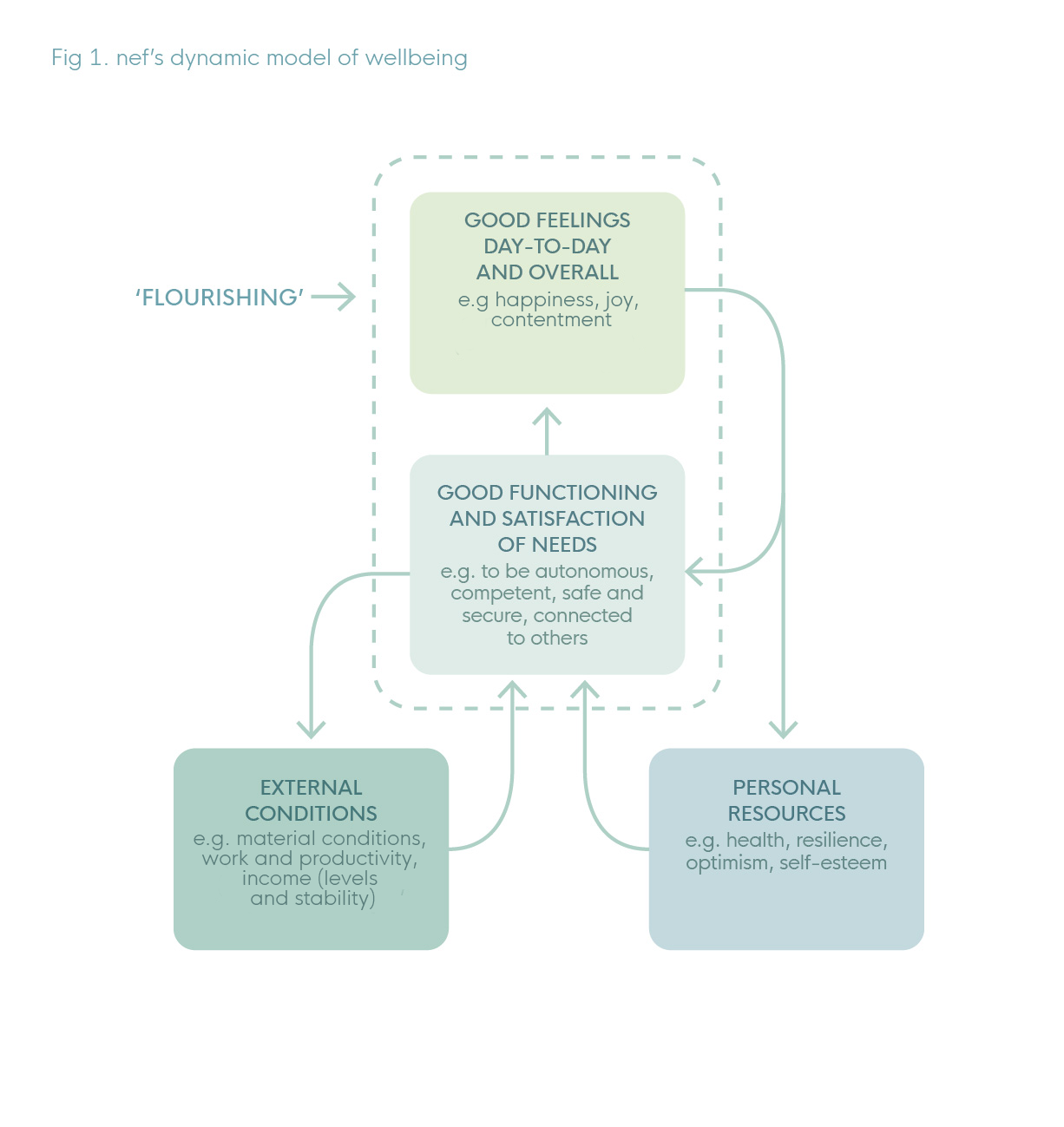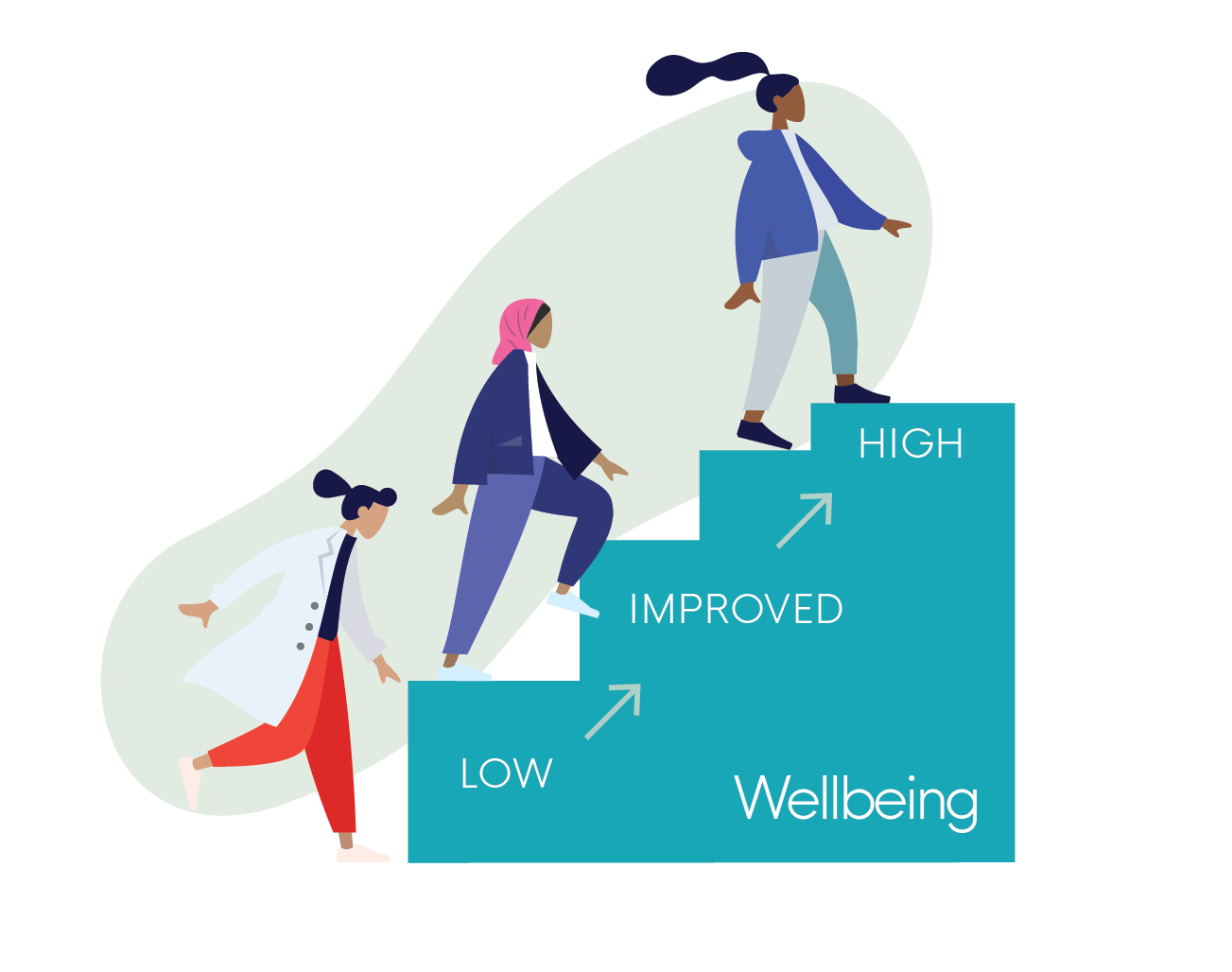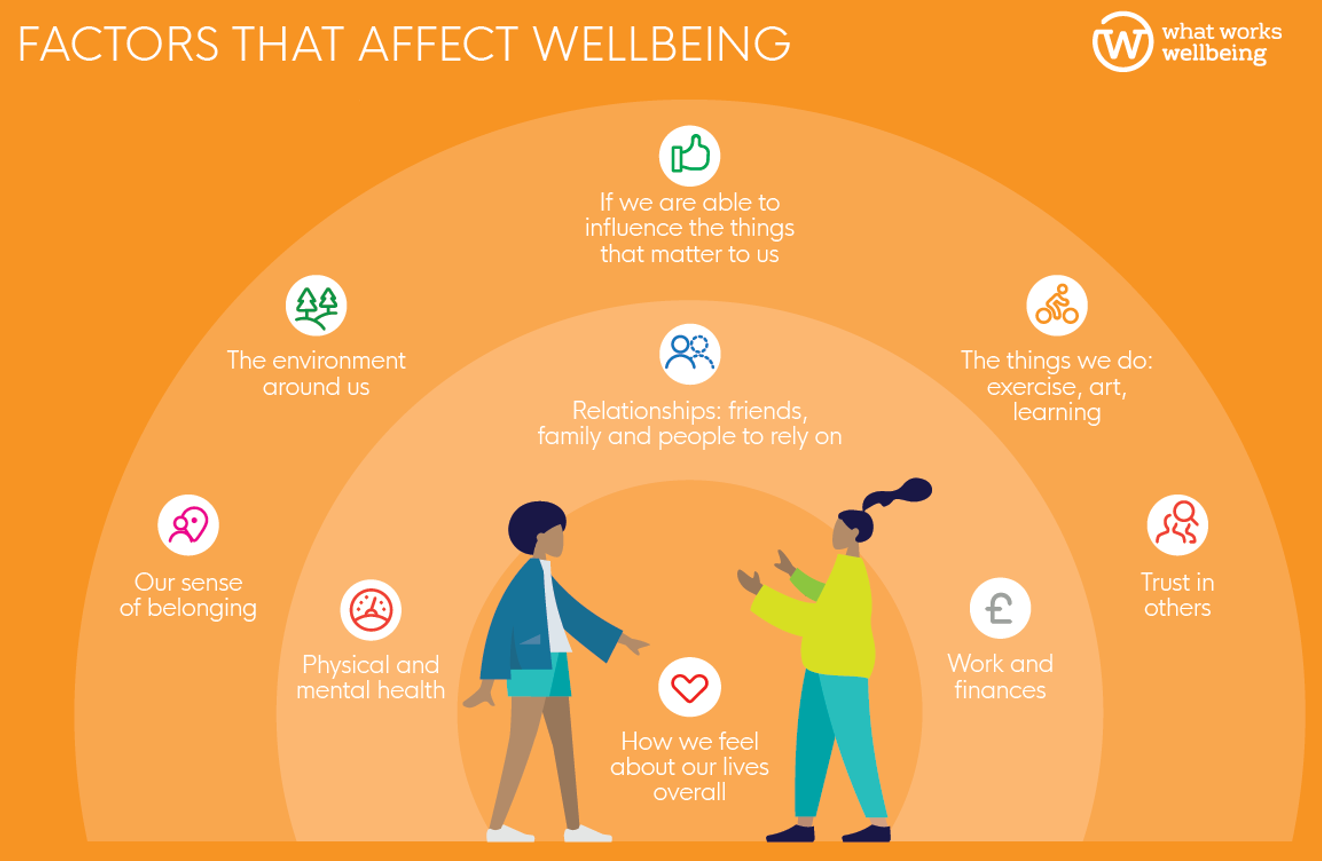What is wellbeing, and what matters?
This section introduces wellbeing concepts and models, as well as the factors that affect wellbeing and how different people experience it
What is wellbeing?
Wellbeing is ‘how we are doing’ as individuals, communities and as a nation, and how sustainable this is for the future.
It isn’t just about how things look from the outside, it’s about how we feel in ourselves. It’s how we experience life – quality of life, good physical and mental health, and being part of our communities. It’s about how external conditions affect our lives and how we function in society.
What affects wellbeing is different for everyone. So, no matter how many positive things we have in our lives, if we don’t feel or experience our lives going well, we can’t describe them as truly going well.
We can understand and measure wellbeing at different ‘levels’ – for example, the individual, community and national level. In this guide we will focus on the wellbeing of individuals.
Wellbeing as ‘flourishing’
One way of understanding wellbeing is how well people are able to flourish – whether they feel positive emotions, can function well in society, can respond to challenges and make meaning in their lives – even as things change. This model of wellbeing is most common in the field of positive psychology, and the work of Martin Seligman. You can learn more about this approach, referred to as PERMA, here.
Wellbeing is responsive and dynamic – it’s not static but changes as different factors and aspects of people’s lives change. This dynamic nature of wellbeing was the basis of New Economic Foundation’s model of wellbeing. It describes how someone’s external conditions interact with their personal resources to allow them to function well and experience positive emotions.

In these models, wellbeing is ever-changing and dynamic, reacting to people’s external conditions and internal resources.
In this guide we will focus on measuring and evaluating three aspects of these models: our good feelings and emotions, our good functioning and sense of purpose and our internal resources.
What affects our wellbeing?
We’re all different. And our background and personal circumstances affect how (and how much) various factors impact our wellbeing. All kinds of things can affect our wellbeing, but some important things are:
Our physical and mental health
How we feel physically and mentally is one of the most important factors for our overall wellbeing. How we are able to manage and deal with diagnoses and changes in health also makes a difference.
Our relationships
Close relationships – with family members or friends – and having someone to rely on are very important for wellbeing. Having wider relationships in society can also make a difference – for example, with neighbours you can talk to and trust. Feeling lonely is very damaging to wellbeing.
Our work
On the whole, having a job is good for wellbeing. Being in a ‘high-quality’ job is even better. These tend to be jobs that provide people with things like job security, good relationships with colleagues and some control over how they work.
Our income
This has a big effect on wellbeing for people living in poverty. But as income increases, and covers basic needs, it becomes less important for improving our wellbeing.
Being in debt can be stressful and debilitating, and can have very negative effects on wellbeing.
The activities we take part in
Different daily activities can affect our wellbeing – from physical exercise to taking part in music or art. How we feel when we do an activity also matters. For example, giving to others or learning something new can give us a sense of purpose, which has a positive effect on wellbeing. Some of these activities have a big impact at the time we do them – others have a longer-term effect.
Our environment
Where we live, work and play matters too. For example, being in nature can reduce stress, and air pollution is associated with low wellbeing.
Autonomy, participation and control
Whether we feel we can influence the things that matter to us, and how we are able to make decisions about the direction of our lives, can impact our wellbeing.
A balance of pleasure and purpose
To feel well, we need a mix of things that bring us pleasure and purpose. For example, it’s important to have positive experiences, and to be able to ‘savour the moment’. But we also need to feel a sense of meaning and purpose, and that the things we do in life are worthwhile.
Go to the resources section of the What Works Centre for Wellbeing website to see evidence summaries on what can make a difference to people’s wellbeing.
What’s most important?
There is no one answer: our genetics, our childhood environment and adult circumstances all contribute. Our physical and mental health, our relationships, our ability to influence our lives, where we live and how we spend our time all play a role.
The importance of each of these is different for different people. We do know that most of these aspects have a smaller influence on our wellbeing the more we have. For example, £10 makes a much bigger difference to someone on minimum wage compared to someone already earning £35k a year. And having one more friend to rely on makes a bigger difference to those with no one than someone with over 20 friends in their close network.
No one of these factors will make us completely happy if another important factor is missing. In short, a balance is important.
Wellbeing inequalities
However, we know that some people are more likely to experience low wellbeing than others.
An Office for National Statistics analysis found that people with the poorest personal wellbeing were most likely to have at least one of the following characteristics or circumstances:
- self-reported very bad or bad health
- be economically inactive with long-term illness or disability
- be middle-aged
- be single, separated, widowed or divorced
- be renters
- have no or basic education
You can learn more about wellbeing inequalities, and what drives them, on our website.
![]() Covid-19: things to consider
Covid-19: things to consider
The Covid-19 pandemic has amplified inequalities across society, including wellbeing. The pressures of the pandemic (on health, jobs, social connections, and education) have meant that some groups are now at higher risk of having low wellbeing.
Different starting points
Everyone has a different level when it comes to wellbeing, and wellbeing fluctuates across people’s lives. You’ll probably be working with people with low or mid-level wellbeing (rather than those who feel very well). Even so, everyone is on different wellbeing trajectories, and your activities may affect them to different degrees.
If you imagine people on a wellbeing ladder, those who are towards the bottom may have a harder time moving up towards better wellbeing than those nearer the top. This is because low wellbeing tends to be caused by serious or multiple factors which are not easy to overcome.

In this section you learned:
- What we mean by wellbeing, and what factors affect it
- How different people experience wellbeing and what affects wellbeing inequalities.
You’re now ready to learn about wellbeing evaluation!


